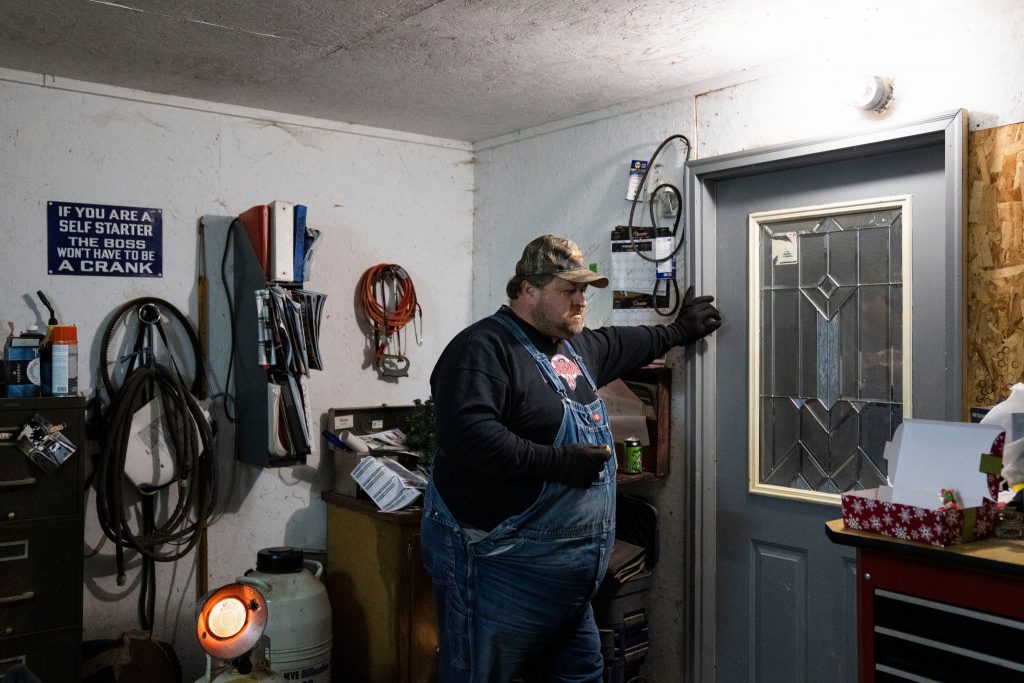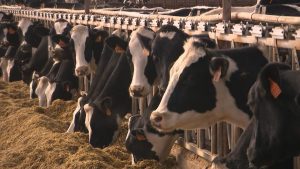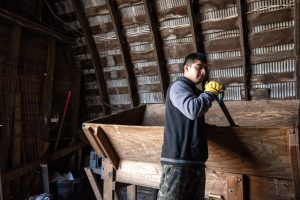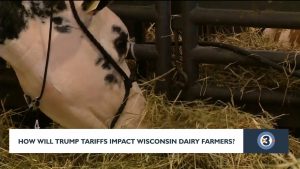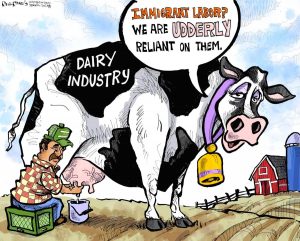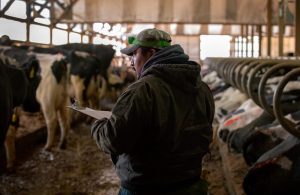
It couldn’t hold a special session on gun violence that lasted more than a few seconds. It had stalled for weeks on releasing money to help farmers struggling with mental health issues.
So Brad Pfaff wasn’t all that shocked that, because of a partisan standoff over postponing the election, thousands of mask-wearing citizens made their way outside during the global coronavirus pandemic to vote last Tuesday.
The rest of the country was seeing Wisconsin’s political dysfunction on display, but Mr. Pfaff has already lived it.
“I was surprised how personal it got,” he said, recalling a different fight: The divisions that kept him from being confirmed as the state’s agriculture secretary. “I never wanted it to be like that.”
A brutal type of scorched-earth political warfare is flaring in America’s Dairyland.
It shows how partisanship pushed to its most strategic outer limits can ensnare not only primary election voters but also cow manure, a Christmas tree, a tourism agency and, in particular, farmers who need help.
“The Wisconsin coal mine is knee deep in dead canaries,” said Ben Wikler, the Wisconsin Democratic Party chairman. “Every possible alarm bell about a partisan divide so extreme to be potentially lethal in a literal sense has been rung.”
Mr. Pfaff inadvertently became one of those warning bells.
Low milk prices and a long global trade war have put farmers in Wisconsin and elsewhere in crisis mode for months — even before a pandemic that produced demand so low that some farmers have dumped their milk. Farms have been going bankrupt at alarming rates, and farmers facing financial ruin have killed themselves.
Late last year, 11 months after he was first named as agriculture secretary, the Republican-led State Senate voted down Mr. Pfaff’s nomination, effectively firing the Democratic nominee who nearly everyone agreed was amply qualified for the task of helping farmers navigate one of the worst farming crises in decades.
“Somebody fired in the middle of a dairy crisis, an agriculture crisis, when he publicly advocated for farmers’ mental health,” said Gov. Tony Evers, a Democrat who was elected by fewer than 30,000 votes, still in disbelief five months later. “God forbid.”
Mr. Pfaff did carry out some of his duties last year, while waiting for confirmation. He hosted an Uzbek delegation studying best practices in potato cultivation and crowned Tequila Naomi, a seven-year-old Jersey, as Cow of the Year.
He wrote a dozen entries in a blog, saying in one post, “In a time of greater and greater polarization, dairy brings us together.”
But even in Wisconsin, America’s Dairyland, where thousands of farmers own more than one million cows, the cows couldn’t overcome partisanship.
The political battle in Wisconsin became particularly heated during the tenure of Gov. Scott Walker, who outraged Democrats by taking on a key liberal tenet: organized labor. After he lost the Statehouse in 2018, Wisconsin Republicans, who now control both chambers of the Statehouse, pushed through measures to strip the powers of newly elected Democrats. In November, Republicans opened a special session the governor had called to take up gun control measures — and then pounded the gavel to close the session after only a few seconds.
Wisconsin’s capital is surrounded by perfect squares of farmland dotted with red barns and grain silos. Out there, roads are named after farmers because the land has been in the family for so long.
“We’re not as Wisconsin nice as we used to be,” said Sachin Chheda, a Democratic consultant based in Milwaukee. “Farms are the badminton shuttlecock being pushed back and forth over the net.”
Brian Fraley, a local Republican strategist, said the divisiveness on display in the decision on the agriculture secretary was nearly universal, whatever the topic. Everyone wants to help farmers, but the political climate complicated things.
“Society in general is becoming more cynical and abrasive,” he said. “The filters are off and people just express themselves more crudely and quickly. They hit send too easily. The rejection of Brad Pfaff was as much about sending a signal to the governor as it was about his qualifications.”
On both sides of the aisle in Wisconsin, the current crisis can seem even more cynical and abrasive. Democrats have argued that pushing forward with the election last Tuesday — after the Republican-dominated Legislature refused to entertain the governor’s request to mail absentee ballots to all voters or reschedule the primary — put voters’ lives at risk.
Brian Reisinger, a Republican strategist, said that line of thinking “fires up our base and turns people off.” He argued that Democrats were “focusing on the flash points.”
When he was first nominated to be agriculture secretary, it didn’t seem inevitable that Mr. Pfaff, the son of dairy farmers who still pitches in on his parents’ farm on the weekends, would become one of those flash points.
“Oh, I loved the job,” he gushed one afternoon. “I knew the seriousness of the situation taking place in the countryside, and I took it very seriously when I traveled and listened and heard what was going on out there.”
Even events that were supposed to be fun played against an inescapable backdrop of economic trouble in the industry. In September, Mr. Pfaff traveled to Milk-n-More Farms in Cecil, Wis., to name Tequila Naomi the state’s Cow of the Year.
“Her udder is extremely well attached,” said Nicolle Wussow, who raises Tequila Naomi as she did the cow’s mother, grandmother and great-grandmother on the farm she took over from her parents, Even before the coronavirus crisis, she said, keeping the farm of 100 dairy cows afloat was difficult.
“The expenses just don’t go down,” Ms. Wussow said.
Across the state all last year, Mr. Pfaff was hearing similar stories. Wisconsin lost 10 percent of its dairy farms in 2019, the largest decline in the state’s history. An agriculture-centric motivational speaker started a lecture circuit. Government statistics reported that the suicide rate was higher than ever; farmer deaths were part of the reason. One farmer carved the number for a suicide hotline in his popular 11-acre corn maze.
Phones were ringing at Mr. Pfaff’s agency’s Farm Center, an advice hotline where five workers field calls. Frank Friar, a retired farm loan executive, started answering calls 12 years ago when farmers were mostly seeking help navigating leasing and fencing disputes. Now, they wanted help saving their farms from financial ruin.
Mr. Friar remembered picking up the phone in the fall to hear one caller say: “I have a gun. I have it hidden, and I have shells.”
The help center was offering farmers who seemed stressed or talked of suicide $100 vouchers they could use in the offices of mental health professionals across the state, a program that had been in place for several years and was paid for through a grant.
The vouchers soon became a touchstone in the partisan battle in the Capitol.
Several years ago, the center issued few vouchers — only 26 were distributed in 2014. But as the farm economy worsened, the need increased; seven times as many vouchers were issued just last year.
One farmer who received vouchers was David Owen, who had been struggling to keep afloat the same farm in Pulaski, Wis., where he grew up. He knew of farmers nearby facing similar hardships who had committed suicide.
“I’m not going to say I wasn’t that far-off,” he said. “I can say it didn’t bother me anymore to die.”
Mr. Owen said he and his wife had yet to cash in the vouchers when they decided to auction off their entire herd of 125 Holsteins. The help center says last year it had a 42 percent redemption rate.
“Once we made the decision to sell, it got a little easier,” Mr. Owen said.
A few days later, just before the auction, he had a heart attack. He earned money this winter doing small carpentry jobs, and on Tuesday he ventured out to vote, casting an all-Republican ballot at the town hall.
At the help center, officials had been granted $200,000 for the vouchers and other programs through the state’s budget process. But members of the Republican-controlled Joint Finance Committee had yet to officially release the money to the center and cash was running low. A fight over information on the program’s effectiveness ensued.
“What we were trying to do is be helpful to the agency and helpful to farmers who needed help,” said Representative Joan Ballweg, a Republican who is co-chairwoman of a task force on suicide prevention.
As lawmakers fought, Mr. Pfaff said he thought back to the frosty morning a year ago when he stood outside a giant dairy barn and marveled at the wreckage from an ice storm. Heaps of snow had crumpled the roof. Animals were wounded, or worse.
“I saw dead cows stacked up like cordwood,” Mr. Pfaff said.
Helplessness was all he felt that day, especially when he saw a teenager hop down from his tractor to join his father surveying the tattered farm that had been in the same family for generations.
That boy might never inherit the family farm, Mr. Pfaff thought. Only $500 was left in the mental health fund, enough for five vouchers. He couldn’t stay quiet.
“If the Joint Finance Committee doesn’t want to move this funding forward immediately, then they have a choice to make: Which five farmers will it be?” Mr. Pfaff complained publicly.
Republicans were outraged at the suggestion their inaction was hurting farmers. The Republican Senate majority leader, Scott Fitzgerald, fired off a letter to Mr. Pfaff, calling his comments “offensive and unproductive.”
Republicans began rallying against Mr. Pfaff. A legislative committee at the start of the year had unanimously voted to support his nomination for agriculture secretary, but Mr. Pfaff had yet to be confirmed by the entire Senate. Rumors buzzed that Republicans might vote to reject him.
The governor quickly scrambled to save his nominee. He held private meetings with Republican senators. They were not swayed. He hosted a euchre party at the governor’s mansion. One Republican showed up.
The day of the vote on his position, Mr. Pfaff knew what was coming. He holed up in his office and ignored the action on the Senate floor. Mr. Evers doubled down, causing a stir by taking a seat in the public gallery of the Senate, an extraordinary move for a sitting governor.
One after another, Democratic senators stood to defend Mr. Pfaff. They noted his record helping farmers as the Wisconsin executive director of the Farm Service Agency under President Barack Obama. He was in 4-H as a youth, they said. Farming was in his DNA. He bleeds manure, one senator said.
From behind the lectern, Mr. Fitzgerald, the majority leader, said he had warned the governor that he didn’t have enough votes for Mr. Pfaff’s nomination to succeed. The governor could have withdrawn the nomination and spared an embarrassing vote.
Frustrated with the situation, Jennifer Shilling, the Senate minority leader, said, “We need statesmen and women to figure out a way that we de-escalate this legislative nuclear war that we are in.”
The votes were counted, and Mr. Pfaff’s nomination was defeated. It was the first time since at least 1987 that the Senate had turned down a cabinet nominee. The governor swore in anger. He appointed a new agriculture secretary. Mr. Pfaff got a job at the State Department of Administration, as director of business and rural development.
Mr. Pfaff cast his ballot early a few weeks ago, before Republicans had asked for an exception to the governor’s stay-at-home orders so citizens could golf and hold Easter services. He didn’t have to venture out Tuesday into what was the culmination of recent partisan bickering — voters lining up during a pandemic.
But Mr. Pfaff recently learned a seat in his district came open in the State Senate. He is considering a candidacy.
